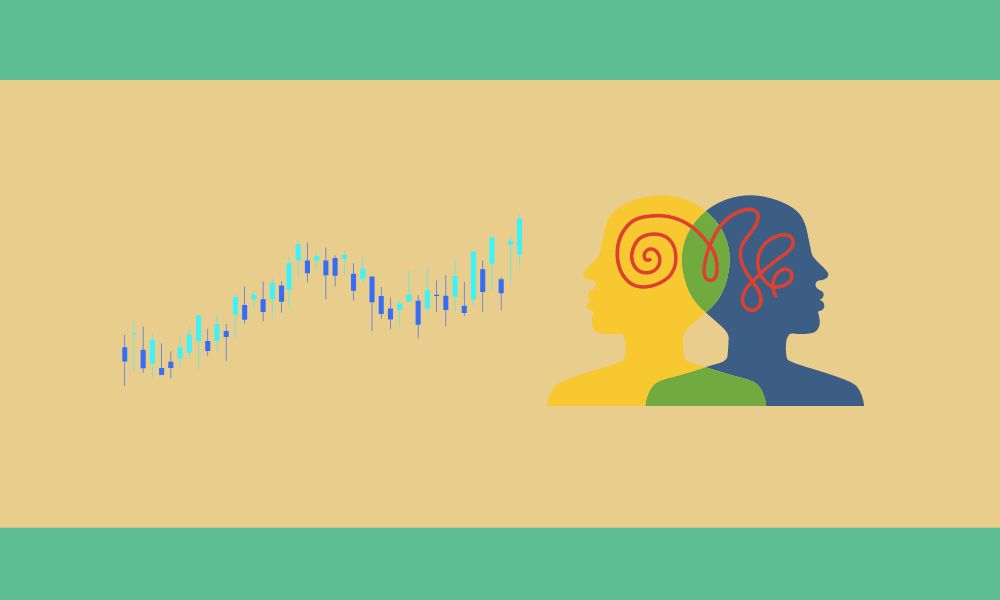
The term "market psychology" refers to the general feeling that drives market trends and price movements.
People don't act in a way that makes sense because they are heavily influenced by cognitive and emotional biases and herd instinct.
All of these things show that markets aren't the efficient engines of rationality that mainstream economics assumes they are.
In fact, technical analysis, a trading strategy that looks for opportunities by analyzing historical price and volume trends, is based on the ideas of market psychology.
To figure out how certain technical indicators work, you need to have a good understanding of how people act in groups.
The psychology of the market is hard to predict, especially since it has such a big effect on people.
However, there are a few reliable signs that help investors guess where the market is going.
Market psychology is the study of how people act and feel about the market as a whole at any given time.
The financial media and analysts often use this term to explain changes in the market that can't be explained by other metrics, like "fundamentals."
Market psychology is the study of how a market acts as a whole based on how people feel and think.
It should not be confused with trader psychology, which is the study of the same things but how they affect just one person.
People think that market psychology is a strong force that may or may not be backed up by facts or events.
For example, if investors suddenly lose faith in the health of the economy and stop buying stocks, the indexes that track the prices of everything on the market will go down.
The prices of individual stocks will fall with the market, no matter how well the companies behind those stocks are doing financially.
Market psychology is made up of many things, including greed, fear, expectations, and euphoria.
It is well known that these ways of thinking can cause the financial markets to go through cycles of "risk-on" and "risk-off," or boom and bust.
People often say that animal spirits are taking over the market when these changes happen. John Maynard Keynes came up with the phrase in his book "The General Theory of Employment, Interest, and Money," which came out in 1936.
When he wrote about animal spirits after the Great Depression, he said that they are a "spontaneous urge to act rather than do nothing."
People say that traditional financial theory, especially the efficient market hypothesis (EMH), doesn't take market psychology into account enough.
It talks about a world where everyone in the market acts logically. It doesn't take into account the emotional side of the market.
But market psychology can lead to an unexpected result that can't be predicted by looking at the fundamentals. In other words, the idea that markets are rational goes against theories of market psychology.
Professional stock pickers often utilize one of two strategies, only one of which pays significant attention to market psychology.
Fundamental analysis aims to choose winning stocks by analyzing the company's financials in the context of its industry. In this world of numbers, market psychology has no place.
Technical analysis is concerned with the trends, patterns, and other factors that influence the price of a stock. One of these drivers is market psychology.
Hedge funds' trend-following quantitative trading tactics are an example of investment techniques that rely in part on capitalizing on fluctuations in market psychology.
Their purpose is to uncover and benefit from disparities between an instrument's fundamentals and the market's perception of it.
Traders utilize a trading strategy as guidance during the trading process. It is a collection of rules that specifies the requirements that must be satisfied before a trade is initiated, which markets should be traded, and when transactions should be exited.
A trading strategy's objective is to keep the trader accountable and on track with the plan.
Having a trading plan is one thing, but adhering to it when deals go against you is quite another. A quick checklist guarantees that the trader follows the guidelines established in the trading strategy throughout the trading process.
As a trader, it is critical to evaluate your progress and discover areas for growth. A notebook is an excellent approach to accomplish this since it allows a trader to keep track of all deals and evaluate what worked and what did not.
A notebook can sometimes reveal flaws in a trading plan or approach that need to be rectified.
Building confidence may be challenging, especially early on when an approach is still being tried. A confident trader is more willing to take calculated risks and accept the consequences of such risks.
This is due to the fact that confident trader is typically aware of their own trading psychology and has put mechanisms in place to control these elements. Trading on a demo account is one technique to gain trading confidence while learning about trading psychology.
The idea is to create reasonable expectations and treat the sample account like real money.
Risk management is something that no trader can afford to overlook. A solid risk management technique includes determining risk/reward ratios, trading using stop losses, and trading with sensible transaction sizes.
Reading market trends and market psychology through the use of precise measures may often seem as effective as reading tea leaves.
You will, however, be in a much better position to sense the mood of the market and change your position accordingly if you take the time to properly choose the indicators, understand the limits of those indicators, and use them in a holistic manner.
What Is The Nature Of Trading Psychology? -EconomyStreets
Week Ahead: What’s Next For British Pound? | EconomyStreets
Strike, A Bitcoin Payment Company, Has Raised $80 Million In A Series B Round | EconomyStreets